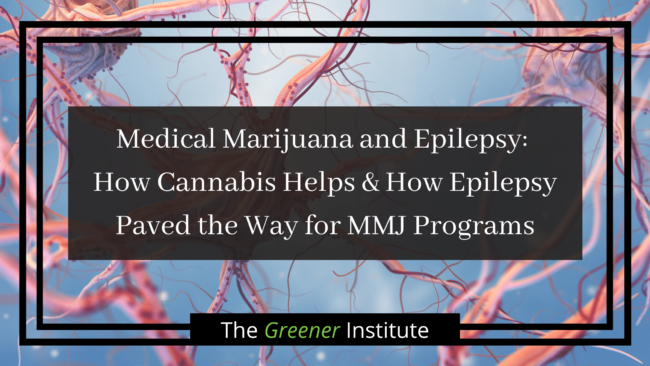
The words medical marijuana and epilepsy have been used in conjunction long before MMJ programs began to be instituted in states across the U.S. For years, medical marijuana advocates, epileptic individuals, and doctors alike have discussed the incredible potential benefits cannabis possesses when it comes to treating the condition.
Clinical trials and medical research surrounding the medicinal benefits of marijuana remain scant due to the substance’s federal status as a Schedule 1 drug. However, anecdotal evidence dating back decades seems to show what the health care system has yet to prove definitively—medical marijuana can be an incredibly potent and powerful treatment for those suffering from epilepsy.
Understanding Epilepsy
As of 2019, the US Centers for Disease Control and Prevention estimated that across the United States there are approximately three million adults and almost half a million children diagnosed with epilepsy. It is the fourth most common neurological condition in the world, with nearly 1 in 26 individuals developing epilepsy at some point in their lives.
Caused by abnormal brain activity that disrupts the electrical communication between neurons and resulting in seizures, epilepsy can have devastating effects on one’s quality of life and overall wellbeing. The severity and frequency of the seizures vary person to person and between different forms of the condition. What’s more, the effectiveness of treatment of epilepsy can also vary greatly.
Being a lifelong condition, many with epilepsy can control the symptoms of the condition through anti-epileptic medications. For some, the condition can even go into remission with the right medications and, more importantly, the right tolerance or reaction to the medications.
A History of Medical Marijuana and Epilepsy
In all honesty, if it wasn’t for epilepsy patients and their advocacy for marijuana, medical marijuana programs may not be in existence today. Those who fought for the use of cannabis in epilepsy treatments quite literally paved the way for the modern era of medicinal marijuana. The turning point, however, occurred when Dr. Sanjay Gupta appeared in a CNN special about treating the condition with Cannabidiol (CBD).
Previously, Dr. Gupta denounced the use of medical marijuana. Years later, at the center of his change of heart stood a young girl whose life changed dramatically when she experienced a significant reduction in the amount and duration of her seizures as a result of a CBD treatment. After the CNN special aired, epilepsy became the forefront of the push to start medical marijuana programs.
How Medical Marijuana Reduces Epilepsy Symptoms
As stated above, epileptic seizures are caused by a disruption in the communication between neurons in the brain. While keeping that in mind, let’s first take a moment to discuss cannabis and the endocannabinoid system (ECS), as well as how it functions within the body.
Our bodies contain their own stockpile of cannabinoid compounds, referred to as endocannabinoids. Marijuana produces phytocannabinoids, which mimic the effects of endocannabinoids. Our bodies produce endocannabinoids in the synapses of neurons in our brains and then bind to receptors on the surface of our brain cells. When this process occurs it does so to modulate a plethora of brain activities—including regulating and promoting healthy brain activity.
With this in mind, it is easy to begin to comprehend just how cannabis may help those who suffer from abnormal brain activity. However, researchers don’t just believe marijuana’s phytocannabinoids can help—they believe that the body’s endocannabinoid system as a whole may bear some responsibility in causing epilepsy and seizures. In an article by Marijuana Doctor the author writes, “Many researchers believe that a deficiency of endocannabinoids or an imbalance in cannabinoid receptors might be at least partly responsible for the uncontrolled brainstorms unleashed during an epileptic seizure. “
While the role of the endocannabinoid system as the cause of the condition remains a hypothesis, other scientists have, at least, begun to demonstrate that marijuana can be a beneficial course of treatment.
In a 2017 experiment, Chung Mo Koo, a Korean researcher, published “Could Cannabidiol be a Treatment Option for Intractable Childhood and Adolescent Epilepsy?” His findings demonstrate that patients who were given 50/mg/kg of CBD per day experienced half as many seizures as they did prior to the new treatment. In a separate trial, Koo found that his patients’ seizures significantly reduced—by about one-third—after only two months of treatment, and by 50% after six months.
Final Thoughts
While epilepsy has led the movement towards wide-scale acceptance of medical marijuana, there is still a long way to go in understanding not just how medical marijuana helps reduce seizures, but also the cause of the condition itself. If you or a loved one is suffering from epilepsy or seizures and have become intolerant to your current course of treatment, why not give medical marijuana and CBD a shot?
For more information please call us at 833-888-5323. If you’re ready to schedule and start your Medical Marijuana journey, you can click here to schedule an appointment.
